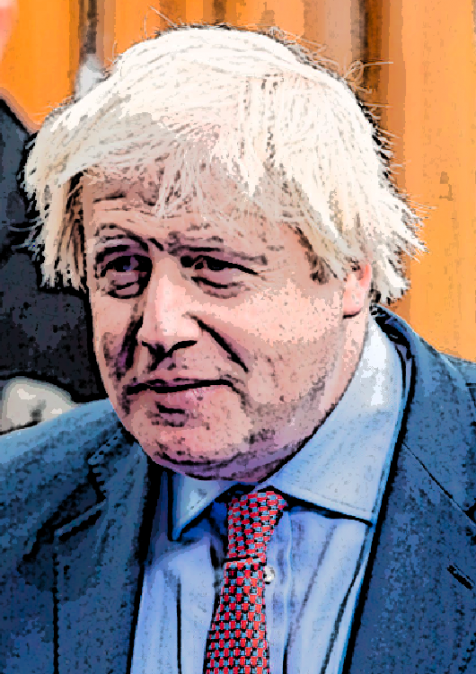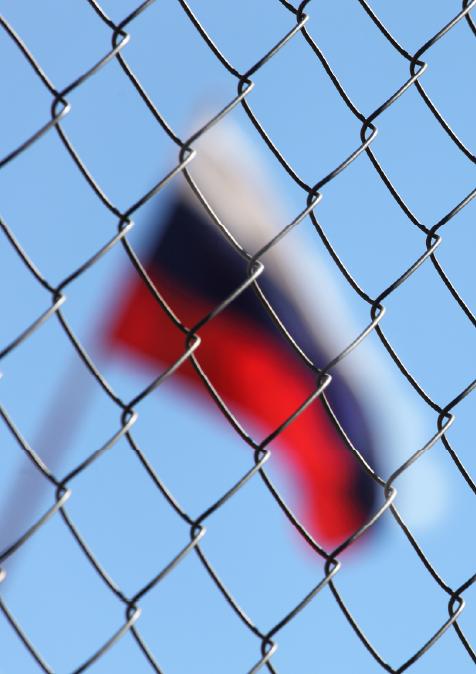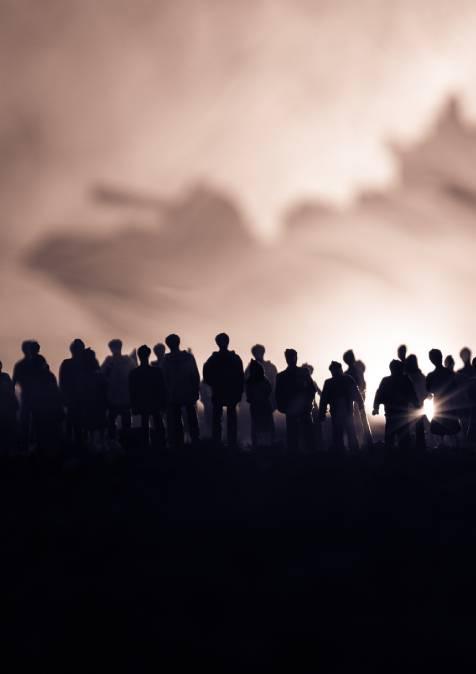Publications /
Opinion
The rules he followed were his own. Made by Boris for Johnson. From his earliest days, Alexander Boris Johnson noted the BBC (July 7, 2022) “tended to believe rules were for other people.” When he worked as a journalist in Brussel’s decades ago, he unchained his phantasy and filed reports which were close to the truth but more often than not, just fake. “His route to No 10 Downing Street “, writes Jonathan Freedland in the “Guardian “(July 7, 2022), “was smoothed with lies.” Once, he was fired, working for the reputable London “Times”, for inventing a quote. A lie, simple as that. Or an insult: as published in 2007 in a column, describing the then US Secretary of State Hillary Clinton as looking like a “sadistic nurse in a mental hospital.” His patterns did not change in Downing Street 10, the official address of Britain‘s Prime minister, where he also lives, obliged to renovate and pay for his apartment. His third wife, Carrie, age 34, recently chose a fancy interior decorator, who proposed golden-colored wallpaper, which was not applauded by the public, battling with virus, inflation, and poverty. Since Boris, as the British named him while still popular, father of seven children, age 58, did not have the necessary funds, a donor of the Conservative Party advanced the financing of the decoration, as he allegedly did, at least partly, a few weeks ago, when Boris Johnson celebrated his wedding outside London on the sumptuous, 18th century “Daylesford House” estate of Lord Bamford, chairman of a construction equipment company. When Boris ordered a national lockdown, having people jailed or fined for not obeying his orders, one person was exempted -Boris Johnson. At least 16 gatherings, some drinking parties in Johnson’s offices or home in Downing Street, were documented ( PBS News Hour, July 7, 2022), while the coronavirus paralyzed Britain. The Downing Street staff enjoyed their splendid isolation and drank excessively even the night before the Duke of Edinburgh's funeral, the Queen's husband. Johnson personally apologized to her majesty and assured the members of parliament repeatedly that he was unaware of the “Partygate”, as it became known- he was shocked” and “sickened” , just another lie, as it turned out, documented by videos and photographs- the leader of Britain was seen with a drink in his hand, not filled with orange juice, mind you. The prime minister also forgot that there was heavy drinking in Downing Street 10 at a Christmas party, which he attended, but erased from his mind.
The convict
Eventually, the police began investigations; government members were fined, as Johnson’s possible successor, the Chancellor of the Exchequer, Rishi Sunak. (BBC, July 7, 2022) Johnson and his wife Carrie were also handed fines- from that moment on; newspaper columnists introduced Johnson as- ‘the convict,”. Deservedly perhaps. “Johnson had stood before the country in one of the darkest hours of the post-war era,” commented the ‘“Guardian” (July 7, 2022), the ghostly pandemic, which closed factories, airports, and pubs, promised his nation “we are all in this together” that lockdown regulations “applied to everyone, including himself. But, as the nation discovered nearly two years later, that was not true.” He broke those rules; indeed, he broke the law. During those troubling days, Johnson decided to promote a close, Russian-born friend, whose father happened to be a former KGB agent (in London during the 1980s)turned oligarch, worth a couple of billions at one time, to the House of Lords. Alexander Lebedev publicly supported the invasion of Crimea, and his son, Evgeny, owner of a British media group (Evening Standard, Independent), pleaded with Moscow to” end the war and the killing of our Ukrainian brothers. MI 5 and MI6 warned the prime minister, who frequently was a guest at the Italian palazzo of his friend, often using the Russian’s private jet, that such a peerage would be a security risk since Saudi business, apparently located in the famous tax haven the Cayman Islands had invested in the media group. Alexander Lebedev’s connection to Putin was shady, at least unclear. Johnson could care less. He denied, for example, that in 2018, as Foreign minister, he had met Alexander Lebedev, a few days after a NATO summit dealing with Russia, secretly at his son’s estate, unaccompanied by close personal security, aka bodyguards, or Foreign office advisers, at a time when Russian agents had tried to poison a former espionage colleague in Britain. Johnson did not use the private jet that weekend but took an “Easy Jet” flight to Pisa to join the 17th-century villa near Perugia (Observer, November 17, 2019). When he returned to London, Johnson seemed overtired, his suit wrinkled, as so he had slept in the vineyard of his Russian friend, if ever there is a vineyard. In December 2020, Evgeny Lebedev took his seat in the House of Lords, forever known as “Baron Lebedev of Hampton and Siberia,” his friend Boris had vouched for him.TV editor Robert Peston described the Lebedev-Johnson friendship in his book “WTF ?”: “Some would argue it is unsettling that Johnson, a mayor of London and then foreign secretary, thought it appropriate to take hospitality from a Russian-born media mogul, whose oligarch father’s relationship with President Putin and the Kremlin is much debated and is certainly opaque.”
His gaffes and blunders became part of his brand
A few days before the mutiny of Johnson’s senior ministers (including Rishi Sunak), the abandoned prime minister admitted to a cross-party group of senior members of parliament his meeting with Lebedev at the palazzo near Perugia four years ago. As the “New York Times” said:” Johnson’s lies worked for years, until they didn’t” ( July 8, 2022). The truth, an unthinkable reality in other, less traditional, and proven democracies, is that “scandals that would have sunk other politicians” (Guardian, July 7, 2022) “appeared not to affect him. He was always able to bounce back. His gaffes and blunders became part of his brand. ” In an age of bland, machine-like politicians, suggests the “Guardian”, he was seen as a “character», his unruly mop of blond hair and bumbling “persona” instantly reproachable even for those with no interest in politics. His fun-loving, relentlessly upbeat image allied to formidable campaigning skills helped reach parts of the electorate more conventional conservatives could not .” The “Guardian’s” Jonathan Freedland remembers that for years,” the conventional wisdom had held that “Boris” was the obvious choice for the jester, but an improbable king “.But after Theresa May won just 9 % of the vote in the 2019 election for the European parliament, his critics were “ready to overlook all the obvious flaws and offer the throne to her polar opposite.” (Guardian)Johnson won two terms as mayor of London, normally a Labour stronghold, and helped convince millions to back Brexit. He became PM in July 2019 without an election but secured a historic landslide victory months later, winning seats in part of the country that had never voted conservatively. He won the general election with an 80-seat majority, the biggest win since 1987. “As 2020 dawned”, reported the BBC ( July 7, 2022), Johnson’s “dominance of British politics appeared to be complete.” His verbal volcano, polished as a student at Oxford University’s debating club, the famous Union, intimidated more than one parliamentarian in the House of Commons since he not only has a temper but was, as Ryan Heath said in “Politico” ( July 7, 2022)” a highly calculated politician. The messiness was by design. And so was the dramatic flair that sometimes led him to overstep.” He survived a confidence motion in June 2022, despite 41 percent of his MP’s voting against him. But some by-election losses of seats the Conservatives controlled for decades led MP‘s to fear, noted the BBC, “he had become an electoral liability. The old magic, it seemed, was no longer working. «In the end, it was not his handling of coronavirus that led to his downfall, but, as the BBC believes, “rather questions about his character and fitness to higher office.” Until September 5, Boris Johnson, a man “utterly unfit to be prime minister”, as his former newspaper boss, Sir Max Hastings, believes, will be housed at Downing Street 10 until early September. As soon as the Conservative Party had chosen its new leader, almost 200 000 members mailed in their decision during august, Foreign Office leader Liz Truss, the former Chancellor of the Exchequer, Rishi Sunak, and the Members of Parliament returned from their vacations; the new Prime minister will form his new cabinet. The Tory leadership race” is hotting up”, noted “Bloomberg”( July 23), the two remaining candidates “pulling out all the stops as they go for the top job in politics”- Tv debates, town hall meetings around the country, on July 25 a BBC debate, a day later the “Sun” , a popular newspaper, will stage for its conservative audience, the Tory loyal, “The fight for No 10” . Liz Truss, 47, remained loyal to Johnson until the bitter end. She served in various Cabinet positions under David Cameron, Theresa May, and the removed PM, who appointed her to the Foreign Office job last year. Until July 5, 2022, Rishi Sunak, 42, a British-born Punjabi Hindu, was a loyal Johnson supporter, yet his resignation provoked the fall of the Prime minister. Sunak, Chancellor from 2020 onward, is married to the daughter of an Indian billionaire. The news that she avoided taxes in England on her considerable income may have hurt the reputation of her husband, who complained that his wife was smeared to get at him. “Johnson will be missed by many, who dislike traditional politicians, Ryan Heath writes in “Politico” (July 7, 2022); his insults were often hilarious when they did not tip over into racism. Who else would turn up for tea with the Queen looking like he just rolled out of bed?” Heath: “Johnson’s ejection from Downing Street is not a rejection of Brexit, or a sign that British conservatism is changing course. It is a rejection of a populist who became unpopular and often lacked a moral compass.”










